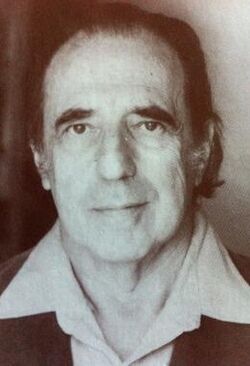Biography:Justus Buchler
Justus Buchler | |
|---|---|
 Buchler in 1979 | |
| Born | March 27, 1914 New York City, New York |
| Died | March 19, 1991 (aged 76) Pennsylvania |
| Era | 20th-century philosophy |
| Region | Western philosophy |
Notable ideas | Natural complex |
Influences
| |
Influenced
| |
Justus Buchler (March 27, 1914 – March 19, 1991) was an American philosopher, author and professor. He made contributions to the subjects of naturalism and metaphysics, introducing the concept of the natural complex.
Biography
Buchler was born in New York City , the eldest of three children of rabbi Samuel Buchler and Ida Frost Buchler. Buchler's sister, Beatrice Buchler Gotthold, was the founding editor of Working Woman magazine, and the first female vice president of the New York Times Company.[1]
Buchler earned his Ph.D. in 1938 from Columbia University; his dissertation was published in 1939 as Charles Peirce's Empiricism. In 1942, Buchler became a full-time instructor at Columbia, where he and mentor John Herman Randall Jr. co-authored the textbook Philosophy: An Introduction. In 1950, Buchler became an associate professor at Columbia; in 1956 he was promoted to full professor.[1]
In 1971, Buchler became Distinguished Professor of Philosophy at the State University of New York at Stony Brook, where he founded a graduate program in philosophical perspectives.[2] In 1972, Buchler was among the founders of the Society for the Advancement of American Philosophy. In 1973, he was awarded the Butler Silver Medal by Columbia University.
Key ideas
Buchler's keystone work, Metaphysics of Natural Complexes, builds upon two major principles: ontological parity,[3] which asserts the equal reality of whatever is, and ordinal metaphysics, which asserts the indefinite complexity of whatever is.[4]
Contrasted most clearly with pre-Socratic philosophers, Buchler believed there was no most simple, fundamental substance or element that comprised the universe. Rather, everything is a complex—specifically a natural complex.
All complexes are located within orders, which Buchler defines as 'a sphere of relatedness'. "Every complex—whether entity, process, relation, or possibility—is what it is in virtue of its locatedness in orders, or 'ordinal locations'. Every complex shares traits or locations with other complexes. Moreover, every complex is itself an order and, hence, is uniquely determinate, that is, different from every other complex."[1]
Buchler's earlier books develop his 'metaphysics of human process'. In Toward a General Theory of Human Judgment, Buchler exchanges experience with a broader concept that he calls proception. "According to Buchler, judgment appraises and discriminates some feature or features of the world... and moves toward 'justification' or validation... As a proceiver, one assimilates features of the world in which one is located and seeks to communicate both to oneself and to others aspects of oneself and of the world that is being proceived."[1]
Critical reception
In 1959, a double issue of The Journal of Philosophy was devoted to Buchler's work. Since original publication, however, Buchler's work has been considered to be outside the dominant analytic trends in philosophy. In Creativity in American Philosophy (1984), Charles Hartshorne comments on Buchler's central concept of natural complexes: "I think almost the entire history of philosophy is against such an idea. Only considerable courage could have made it seem worth while to challenge this tradition."[1]
In his 2002 book Socrates Cafe, Christopher Phillips wrote that "Buchler's novel approach to metaphysics seems to herald what Lee Smolin calls 'the lightness of the new search for knowledge'. This search, he says, is based on an underlying philosophy that 'the universe is a network of relations'."[2]
Political activism
Buchler was an active opponent of McCarthyism, co−authoring the paper Academic Due Process: A Statement of Desirable Procedures Applicable within Educational Institutions in Cases Involving Academic Freedom in 1954. In 1961, he co−authored Academic Freedom and Civil Liberties of Students in Colleges and Universities and Teacher Disclosure of Information about Students to Prospective Employers; the latter was adopted as a policy statement of the ACLU.[1] From 1958 to 1965, Buchler was Vice Chairman for the National Academic Freedom Committee of the ACLU.[4]
Works
Primary books
- Charles Peirce's Empiricism (1939)
- Toward a General Theory of Human Judgment (1951)
- Nature and Judgment (1955)
- The Concept of Method (1961)
- Metaphysics of Natural Complexes (1966)
- The Main of Light: On the Concept of Poetry (1974)
Other books
- Editor: The Philosophy of Peirce: Selected Writings (1940)
- With John H. Randall Jr.: Philosophy: An Introduction (1942)
Selected articles
- "Russell and the Principle of Ethics", in The Philosophy of Bertrand Russell (1944)
- "The Liberal Arts and General Education" (1952)
- "What Is the Pragmaticist Theory of Meaning?", in Studies in the Philosophy of Charles Sanders Peirce, pp. 21−32 (1952)
- "On the Problem of Liberal Education" (1954)
- "What Is a Discussion?" (1954)
- "Reconstruction in the Liberal Arts" (1954)
- "Ontological Parity", in Naturalism and Historical Understanding: Essays on the Philosophy of John Herman Randall, Jr. (1967)
- "On the Concept of 'The World"', Review of Metaphysics 31, pp. 555–79 (1978)
- "Probing the Idea of Nature", Process Studies 8, pp. 157–68 (1979)
See also
- List of American philosophers
References
- ↑ 1.0 1.1 1.2 1.3 1.4 1.5 Biography of Justus Buchler by Kathleen A. Wallace
- ↑ 2.0 2.1 Socrates Cafe, by Christopher Phillips
- ↑ "This principle asserts the equal reality of whatever is: attributes are as real as substances, relations as real as entities, the impermanent as real as the fixed, the mental as real as the physical, human beings and the human order as real as God and the divine order, fictional entities as real as physical ones, and so on. Buchler's metaphysical orientation is, thus, nonreductionistic, nonhierarchical, and all−inclusive." Biography of Justus Buchler by Kathleen A. Wallace
- ↑ 4.0 4.1 Dictionary of American Philosophers, Volume 1

